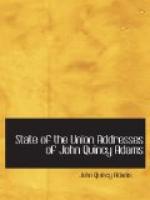To preserve, to improve, and to perpetuate the sources and to direct in their most effective channels the streams which contribute to the public weal is the purpose for which Government was instituted. Objects of deep importance to the welfare of the Union are constantly recurring to demand the attention of the Federal Legislature, and they call with accumulated interest at the first meeting of the two Houses after their periodical renovation. To present to their consideration from time to time subjects in which the interests of the nation are most deeply involved, and for the regulation of which the legislative will is alone competent, is a duty prescribed by the Constitution, to the performance of which the first meeting of the new Congress is a period eminently appropriate, and which it is now my purpose to discharge.
Our relations of friendship with the other nations of the earth, political and commercial, have been preserved unimpaired, and the opportunities to improve them have been cultivated with anxious and unremitting attention. A negotiation upon subjects of high and delicate interest with the Government of Great Britain has terminated in the adjustment of some of the questions at issue upon satisfactory terms and the postponement of others for future discussion and agreement.
The purposes of the convention concluded at St. Petersburg on July 12th, 1822, under the mediation of the late Emperor Alexander, have been carried into effect by a subsequent convention, concluded at London on November 13th, 1826, the ratifications of which were exchanged at that place on February 6th, 1827. A copy of the proclamations issued on March 19th, 1827, publishing this convention, is herewith communicated to Congress. The sum of $1,204,960, therein stipulated to be paid to the claimants of indemnity under the first article of the treaty of Ghent, has been duly received, and the commission instituted, conformably to the act of Congress of March 2d, 1827, for the distribution of the indemnity of the persons entitled to receive it are now in session and approaching the consummation of their labors. This final disposal of one of the most painful topics of collision between the United States and Great Britain not only affords an occasion of gratulation to ourselves, but has had the happiest effect in promoting a friendly disposition and in softening asperities upon other objects of discussion; nor ought it to pass without the tribute of a frank and cordial acknowledgment of the magnanimity with which an honorable nation, by the reparation of their own wrongs, achieves a triumph more glorious than any field of blood can ever bestow.




